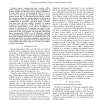Free Online Productivity Tools
i2Speak
i2Symbol
i2OCR
iTex2Img
iWeb2Print
iWeb2Shot
i2Type
iPdf2Split
iPdf2Merge
i2Bopomofo
i2Arabic
i2Style
i2Image
i2PDF
iLatex2Rtf
Sci2ools
181
click to vote
CCECE
2015
IEEE
2015
IEEE
Robust group sparse representation via half-quadratic optimization for face recognition
— Sparse representation-based classifier (SRC), which represents a test sample with a linear combination of training samples, has shown promise in pattern classification. However, there are two shortcomings in SRC: (1) the ℓ2norm used to measure the reconstruction fidelity is noisesensitive and (2) the ℓ1-norm induced sparsity did not consider the correlation among the training samples. Furthermore, in real applications, face images with similar variations, such as illumination or expression, often have higher correlation than those from the same subject. Therefore, we propose to improve the performance of SRC from two aspects: (1) replace the noise-sensitive ℓ2-norm with an M-estimator to enhance its robustness and (2) emphasize the sparsity of the number of classes instead of the number of training samples, which leads to the group sparsity. The proposed robust group sparse representation (RGSR) can be efficiently optimized via alternating minimization under the Half-Quad...
Related Content
| Added | 17 Apr 2016 |
| Updated | 17 Apr 2016 |
| Type | Journal |
| Year | 2015 |
| Where | CCECE |
| Authors | Yong Peng, Bao-Liang Lu |
Comments (0)

